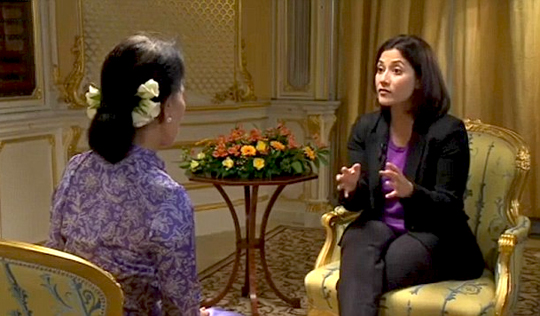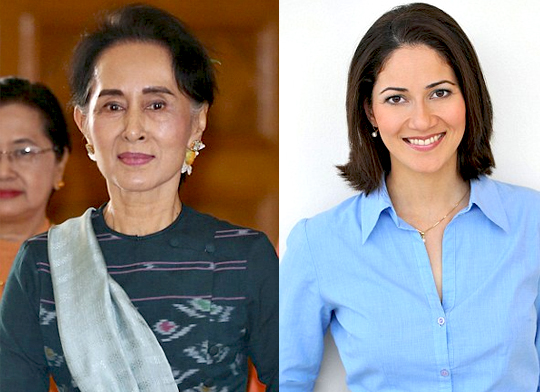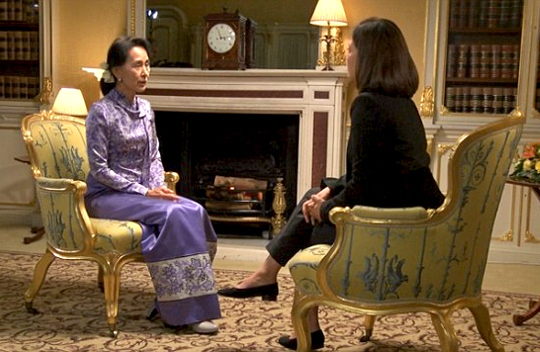She is a Nobel Peace Prize laureate and a beacon of saintly integrity in the West who remained under house arrest for 15 years in her native Burma.
However, there is another side to Burmese politician Aung San Suu Kyi that sits at odds with her iconic image.
After the BBC Today presenter Mishal Husain gave Suu Kyi a rough ride during a BBC interview, Suu Kyi lost her composure and was heard to mutter angrily off-air: ‘No one told me I was going to be interviewed by a Muslim.'
The spat between the two prominent and famously elegant Asian women has only just emerged, and followed a heated interview with the 70-year-old president of Myanmar's National League for Democracy on the Today programme, according to a new book, The Lady And The Generals: Aung San Suu Kyi And Burma's Struggle For Freedom, by Peter Popham.
Suu Kyi's equivocal attitude towards the violence suffered by Burma's Muslim minority has alarmed even her most dedicated fans.
When she was repeatedly asked by Husain to condemn anti-Islamic sentiment and the wave of mob-led massacres of Muslims in Myanmar, she declined to do so. ‘I think there are many, many Buddhists who have also left the country for various reasons,' she replied. ‘This is a result of our sufferings under a dictatorial regime.'
Much of the country's huge Buddhist majority dislikes its small Muslim community with a passion, so it is thought Suu Kyi did not want to alienate her supporters.

Muslims are only 4 per cent of Burma's population. The Rohingya Muslims, who have borne the brunt of the violence, are a smaller minority still. The Rohingya are explicitly forbidden from becoming citizens of Burma and have no political weight whatsoever.
Husain, 43, was the first Muslim presenter of Radio 4's Today programme.
But while often seen as a symbol of the BBC's commitment to diversity, she is, herself, thumpingly posh.
The mother-of-three and Northampton-born daughter of Pakistani parents was educated at private school and Cambridge University, where she read law.
Known as the Lady of Burma, 70-year-old Aung San Suu Kyi is a pro-democracy campaigner and the opposition leader in Myanmar, who was awarded the Nobel Peace Prize in 1991.
The leader of the National League of Democracy, has led an extraordinary life, despite spending 20 years of it under house arrest.
She was born in Rangoon – now Yangon – but when she was just two years old her father was assassinated.
Her father, Aung San, had founded the modern Myanmar army and negotiated independence from the British Empire in 1947.
But he was assassinated by his rivals in the same year.
When she was 15, in 1960, her mother was appointed Burmese ambassador to India and Nepal and Suu Kyi accompanied her there.
She completed her education in New Delhi, gaining a degree in politics. She went on to obtain a Masters in Philosophy, Politics and Economics from Oxford.
She returned to Myanmar in 1988, shortly before a military junta took power and launched her career in politics in earnest.
Influenced by both Mahatma Gandhi's philosophies, and her own principles as a Theravada Buddhist, she entered politics to work for democratisation.
She helped found founded the National League for Democracy in September 1988.
In 1990, Suu Kyi's NLD party received 59 per cent of the votes in a general election called by the military junta.
But the results were nullified and the military refused to hand over power, causing an international outcry.
She was placed under house arrest, during which time she was awarded the Nobel Peace Prize and the Sakharov Prize for Freedom of Thought.
She used the $1.3million prize money to establish a health and education trust for the people of Myanmar.
While under house arrest, she spent her time reading about philosophy, politics and biographies that her husband had sent her.
She was offered the option of freedom, as long as she never returned to her country. But rather than accept the opportunity to live an un-political life with her husband and two children, she chose to not abandon her people.
In November, her opposition party secured a landslide victory in the Burmese elections.
A legacy of rule of military junta means Suu Kyi cannot become president herself, however, this week it was announced that she would become a minister in Myanmar's new cabinet when it takes power next month.








Comments
Add new comment